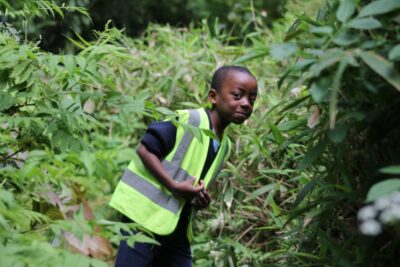Who is IQM?
IQM is the only national inclusion award in the UK. For over 20 years and in over 20 countries, schools, MATs and Local Authorities use the Inclusion Quality Mark to recognise exemplary inclusive practice.
Get in touch for your FREE school information pack today.
St Luke’s Catholic Academy Achieves Inclusive School Award
December 4, 2023
St Luke’s Catholic Academy has achieved the Inclusive School Award.

Joyful and Inclusive School
St Luke’s Catholic Academy is a one-form primary school in Harlow, Essex. There are currently 232 pupils on roll from Nursery to Year 6. The need of pupils and their families is growing across the school with 15% of the pupil demographic currently being registered as in receipt of Pupil Premium, which is below the national average. The largest growth is in SEND where 19.5% of pupils are registered, which is higher than the national average. Those with an Education Health Care Plan (EHCP) are broadly in line with national averages. English is the main language spoken at home; however, the number of pupils with English as an Additional Language (EAL) is higher than the national average, with 28.5% of pupils on the EAL register.

The school was inspected by Ofsted in 2018 and recognised the school as ‘Good’ overall. More recently, it was inspected by the Catholic Schools Inspectorate in June 2023.
This report highlights that: “St Luke’s is a joyful and inclusive school”; “Engagement with parents is strong and the school works well in partnership with them”; There is a “family feel”; “Leaders take the wellbeing and support of all staff seriously and prioritise actions that will enable them to be happy .. and to carry out their tasks effectively”.
Values are Deeply Embedded
St Luke’s Catholic Academy shares its inclusive ethos from the moment you enter the school site. The ten values are proudly shared with the school community on a tree displayed in the entrance hall and it is clear they are fully embedded in school life. When you arrive at the school site there is a happy smile to greet you from the Site Manager who welcomes you wholeheartedly, setting the tone for your visit. As you tour the school, it is clear that the values are deeply embedded in inclusion.

Staff and pupils are friendly and kind, pupils hold doors open for you and greet you as you walk by. This interaction with adults is confident and they are happy to share their learning and what they are doing. The classrooms and external learning areas are thoughtfully curated to showcase learning but also to embed the values further.
The leadership at St Luke’s is purposeful and confident. The Executive Headteacher and Head of School have a strong knowledge of the school and they have a clear vision as to what they are trying to achieve against changing school needs. There is an honesty around the challenges within mainstream schooling, but they are keen to invest further in the development of an inclusive culture. Governors and leaders have invested financially in the development of roles that drive this school development forward including that of the Inclusion Lead and HLTA roles. It is obvious that the Head of School knows her staff well and works hard to support them emotionally and professionally. Adapting approaches to support in different ways from a gentle check-in to a more structured approach if needed. The Executive Headteacher talks of the staffing team being ‘in synergy’ which our Assessor witnessed during the visit.
Passionate About Meeting the Needs of Pupils
The Inclusion Lead, alongside the HLTA and wider staffing team, is passionate about meeting the needs of pupils regardless of the barriers presented. They work closely with families, getting to know them well and the challenges they are facing. There is a strong emphasis on honesty and ensuring that families are well supported as they manage the challenges that come their way. The Inclusion Lead has a strong knowledge of the external services available and often uses well-cultivated contacts to support her when some external services are unavailable. Parents speak of how supportive this is and said, “the Inclusion Lead supported us through the process”.

Supported by a creative HLTA role, the Inclusion Lead has been able to set up additional interventions alongside the Caritas Curriculum whilst enabling children to feel included. A chill-out room, writing and reading interventions, and counselling support are all offered. These are all reviewed after six weeks ensuring that impact can be measured. The Inclusion Lead has a strong knowledge of the Caritas Curriculum that the school has adopted and this, coupled with her knowledge of working in other schools and at different leadership levels, enables her to support SEND pupils in a way that they feel included in lessons.
Strong Team that All Pitch In
St Luke’s staffing team describes themselves as a, “strong team that all pitch in”. They share responsibility for the pupils in their care and each other and talk of ‘camaraderie’ in which everyone is approachable. It is clear that they are happy and positive about their work and keen to share how they manage to include significant needs within their class and work, whilst being supported by leaders. All adults working within the school are kind and nurturing and all contribute to the strong inclusive ethos. This can be seen in their interactions with children and families. Parents speak of the staff within their child’s class as, “knowing their child well” and “happy to adapt the curriculum to support them individually.”
The senior leaders at St Luke’s Catholic Academy support their staff with up-to-date training that is needed to cater to the pupils’ needs. Middle Leaders have accessed high-quality research-led National Professional Qualifications (NPQs) which have shaped school development in their subject and with pupil behaviour. The good practice at St Luke’s has been shared across the Trust and the Inclusion Lead works across two schools building strong inclusive teams and practice. Leaders ensure that all staff view the holistic needs of pupils and their families and are keen to build connectivity amongst their school community. Quality First Teaching (QFT) is strong at St Luke’s and there is the belief that it is the best vehicle for meeting needs.
Families are Well Supported

Families are well supported, and this is recognised by the families themselves. The Inclusion Lead is impactful and honest, working closely with families to agree on a way forward that is in the best interests of the child. She manages the challenges of this well and supported by the Head of School, provides empathetic intervention when it is needed. Parents talk of how their need to access external support such as Families in Focus is less, as the support from school reassures them and gives them a voice. When meeting with them, they say that, “they are never on their own, the school finds a way”. They also talk of highly personalised support, “they deal with each child’s needs at each point in time when it is needed”.
It is evident from the evidence presented during the IQM Inclusive School Award assessment that the leaders know their school well and have access to high quality data and information. Governors have been reassured by the data being presented more regularly to them and our Assessor met a Governor who had been invited to meet with the Inclusion Lead to see this in action. The school’s profile has changed with the need increasing, and the leaders have worked hard to ensure the challenges of this are met but also that Governors are aware. Many pupils join the school at a different point of entry to Reception and teachers talked about how these pupils are well supported and everyone is welcomed. Whilst in classes, learning was settled and routines in place showing the commitment to this cause.
Commitment
There have been changes to the structure of the Trust Board and Governing Board as a third school entered the Trust. The Governors met, spoke about this positively, knowing that a smaller Governing Body focused on one school could bring real advantages. Whilst there have been changes in the Governing Body, there is a commitment to building a comprehensive skill set and this is beginning to support the school further.

The school holds a good level of data on SEND pupils and this shows that Speech, Language and Communication Needs (SLCN) are the most significant needs within school. The need is met well here across the school as part of Quality First Teaching (QFT) and through the development of Trauma Perceptive Practice (TPP). Visual timetables and prompts are used in all classes as well as interventions to support reading and writing development. The HLTA’s role is crucial in delivering these. Those pupils with EHCP have Autism as their presenting need and again the use of additional adults to support pupils within their class is impactful. There has been a significant cultural shift in the use of adults within the class and this supports pupils in a way that is personalised and inclusive.
It is clear when you speak to middle leaders that research-led staff development is promoted. Staff have access to high quality leadership CPD (Continuous Professional Development) which enables them to drive forward school improvements. Staff talked of being encouraged to explore themes in their leadership of subjects and areas.
Whole-school staff CPD sessions enable the sharing of good practice across the school and there are opportunities to attend Trust staff development sessions. There are weekly support staff sessions where staff have access to external speakers and can share their own training amongst them. These sessions mirror the teaching staff ones so there is a cohesive approach.
Find out more about the IQM Inclusive School Award
If your school is interested in obtaining the IQM Inclusive School Award or you wish to talk to a member of the IQM team please telephone:
028 7127 7857 (9.00 am to 5.00 pm)
or email: admin@iqmaward.com for further details.
Want more information on the IQM Award? Click here to request your free IQM information pack.
Other Posts

About IQM
The only national award for inclusion in the UK, IQM has been committed to recognising exemplary inclusive schools for over 20 years and in over 20 countries around the world. The three awards allow schools and organisations to celebrate their inclusive practice against nationally recognised framework.
Site Links
© 2026 Inclusion Quality Mark | website developed & cared for by digidoda


